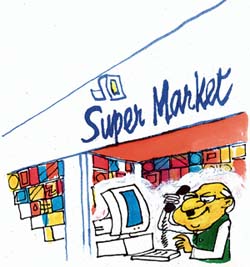
Monday,
May 5, 2003 |
 |
Feature |
 |
Selling through phone’s
receiver
Vijay Satokar
 Remember
whom did you last give your business card to and where? Casually giving
your business card may earn somebody a good business but flood you with
unwanted calls from credit card companies, estate agents, car financers
and cellular phone operators. Remember
whom did you last give your business card to and where? Casually giving
your business card may earn somebody a good business but flood you with
unwanted calls from credit card companies, estate agents, car financers
and cellular phone operators.
Welcome to the world of
telemarketing, the latest mantra in selling products and being used by
business house from New Delhi to New York alike.
Exchange of information on
potential clients has become a big business. Faced with fierce
competition, the bankers, cellular phone companies or even hotels are
suddenly interested in getting a common man’s patronage.
"Telemarketing is one
area which is picking up fast in India. Many companies are willing to
pay fees to purchase databases of high-end customers," those in the
business say.
"The reservoir of
cheap talent puts India in a position to stake claim to big chunks of
new IT service markets. One area is IT-enabled services: telemarketing,
help-desk support, medical transcription, insurance claim and credit
card processing - any service which can be delivered via phones,
computers and the Internet," says Kiran Karnik, President, Nasscom
(National Association of Software and Service Companies).
A number of international
companies have set up telemarketing and call centres in India to
outsource customer service and telemarketing at very low costs and in an
efficient manner, says Amardeep, a call centre executive.
Although telemarketing and
contact centre business have picked up in India, the business here is
mostly dependent on business originating from the USA and Britain, he
says.
However, the use of call
centres by domestic companies too is undergoing enormous growth due to
importance attached by companies to customer care, telemarketing for
product offerings, telebanking, concept of direct response television
and home shopping and market liberalisation of utilities, says Deepika
Maini, team leader of a customer care wing in a call centre.
In addition, telemarketing
is growing and information lines are forming part of many product
service offerings. Telephone banking has led to mushrooming of call
centres in the financial services sector, while in retail the increase
in direct response television and home shopping have driven call centre
growth, says Maini.
Finally, the growth of
direct marketing has also contributed to the popularity of call centres
as a means of reaching targeted customer bases, she says.
Call centres provide large
and small international enterprises with the unique ability to establish
a presence in foreign markets without the expense and complexity of
owning and managing their own infrastructure, says Amardeep.
Meanwhile, flooded with
complaints from customers of unwanted calls, the Federal Trade
Commission (FTC) of the USA has amended the Telemarketing Sales Rule (TSR)
to give consumers a choice about whether they want to receive most
telemarketing calls.
American consumers soon
will be able to put their phone numbers on a national ‘do not call’
registry. It will be illegal for most telemarketers to call a number
listed on the registry. Calling phone numbers on the list could cost
these home-invading slimeballs as much as $11,000—per call.
"Even if that money
is never actually collected, I hope the possibility will put a little
fear into these, well, home-invading slimeballs. It may not be long that
India too may have to enact a similar legislation", says a harassed
executive.
|

